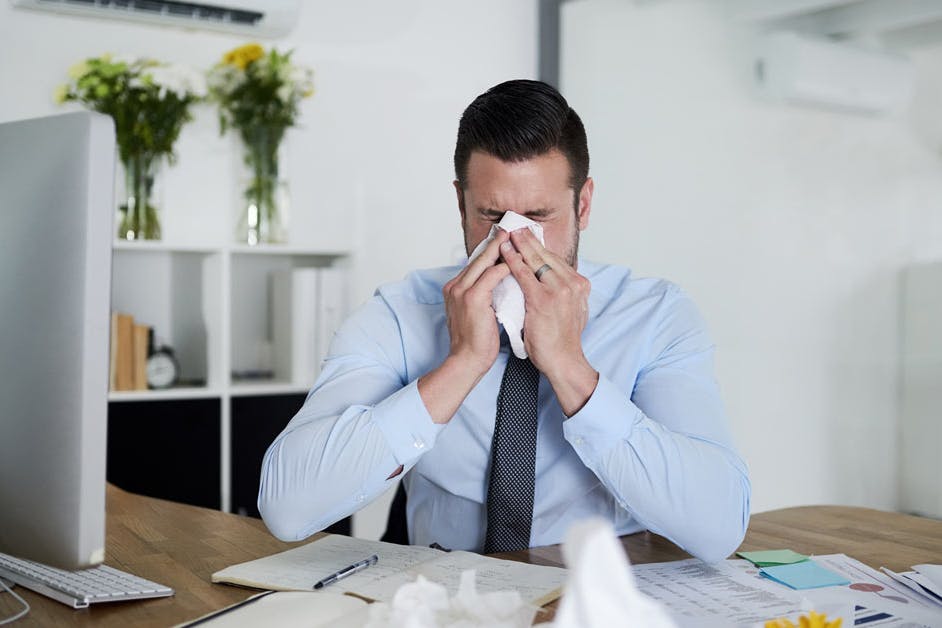Can Allergies Cause a Sore Throat?
Feeling like you’re forced between staying indoors and a runny nose? Relief is possible. Discover 11 natural ways to fight allergies.

Throughout the year, plants, trees, and flowers release different pollens. As fun as it may sound to run through a field of wildflowers, runny noses and sore throats keep many people stuck inside with the windows closed. Luckily, many patients find that natural relief is possible with the right remedies.
Why Can Allergies Cause a Sore Throat?
When we’re exposed to an allergen (a foreign substance not produced by our bodies) our bodies recognize it as a threat. To fight that threat, our immune systems attempt to eradicate the allergen. The most common way our immune system does so is with mucous — congestion in the nose and sinuses.
Sometimes this congestion creates a runny nose. Other times this congestion drains down the throat, which is known as a postnasal drip. This drainage can cause a variety of unwanted allergy symptoms, including:
- Coughing
- Excessing swallowing
- Throat irritation
- Difficulty speaking
- Nausea
Many allergies are seasonal. However, it’s not uncommon for individuals to experience symptoms year-round, especially if they are triggered by more than one irritant. Common allergens and irritants include:
- Pollinating flowers and trees
- Grass
- Dust mites
- Mold and mildew
- Pet dander
- Cigarette smoke
Popular Health Tips
11 Natural Ways to Get Allergy Relief
While many people turn to over-the-counter and prescription allergy medications, these laboratory-engineered drugs expose your body to an entirely new set of possible symptoms, allergic reactions or side effects. Antihistamines commonly cause drowsiness, so much so they “are intended to be used for only a night or two.”
Decongestants can lead to high blood pressure, anxiety, dizziness and even seizures. So, use these natural and alternative home remedies to grab the pollen by the fluff, so to speak.
1. Sip Apple Cider Vinegar
It’s easy for hay fever to cause your nasal passages to become clogged. Drinking apple cider vinegar can help increase your body’s potassium levels naturally. Potassium encourages the mucus to break up and leave the body, providing spring allergy relief so you can breathe normally again.
But don’t just grab a big bottle from the store and drink it straight. You’ll want to dilute it with water and a bit of lemon juice. Not only will this make it more palatable, it’ll be easier on your digestive system.

Don't skip the picnic because you're afraid of grass. Natural allergy protection can help you reduce or eliminate unwanted symptoms.
2. Get Steamy
Though a temporary fix, steam can provide a more immediate relief to your hay fever symptoms. Hop in the shower, turn the water up as warm as you can stand, and breathe deeply. If possible, attempt to breathe through your nose, allowing as much mucous to be expelled as possible.
3. Enjoy the Fragrant Scent of Eucalyptus
The 2010 study, ‘Immune-modifying and antimicrobial effects of Eucalyptus oil and simple inhalation devices,’ found the scent of eucalyptus could help soothe respiratory problems. It can be introduced through incents. You may consider rubbing some eucalyptus oil on your chest. Or you might want to take a small bit of eucalyptus oil into your steamy shower.
4. Eat Spicy Food
Spicy food has been known to cause mucus to thin and noses to run. Use this to your advantage. Add some heat to your meals. Go heavy on the wasabi and ginger. Use plenty of garlic. Ramp up the jalapeños and cayenne pepper. But make sure you have plenty of tissues on hand. You’ll want them to deal with your runny nose.
5. Get Lots of Vitamin C
As a natural antihistamine, Vitamin C can offer allergy relief without those pesky side effects. Try to incorporate Vitamin C rich foods into your diet, such as:
- Oranges
- Strawberries
- Pineapple
- Mango
- Brussels Sprouts
- Kiwifruit
- Papaya
- Bell Peppers
- Broccoli

When allergies get the best of you, it can make even the simplest of tasks excruciating. Luckily, natural solutions can help you clear out that mucus so you can regain control of your health.
6. Indulge in Local Honey
Local honey is made with local pollen. This means it contains many (if not all) of the local pollens to which you’re reacting. By consuming a small amount of local honey each day, you can help your body build up a tolerance to its native environment so that spring doesn’t overwhelm your system.
It’s important to remember, this isn’t a tactic that offers immediate relief. Rather, it’s a long-term step you’ll want to start taking as soon as possible.
7. Load up on ‘Life Culture’ Foods
‘Live culture’ foods are foods loaded with living enzymes known as probiotics. As gross as that sounds, probiotics help protect the lining of your intestines, boost your immunity, and help you fight off infection. These foods include:
- Kimchi
- Kombucha
- Sauerkraut
- Pickles
- Miso
- Yogurt
8. Hydrate Like a Boss
The health benefits of water are too many to list. But the long and short of it is, drink lots of water. Water flushes your system, helping remove any unwater foreign bodies – like grass pollen. It keeps your immune system from being on high alert, which is a common occurrence when your body’s depleted.

Don't let spring allergies keep you and your family from enjoying the outdoors.
9. Add Fatty Acids
When you’re battling hay fever, it’s common for your eyes, throat, and nose to swell. Fatty acids are a natural anti-inflammatory, helping to reduce inflammation. Good sources of fatty acids include:
- Fish, especially salmon and sardines
- Flax seeds
- Walnuts
- Almonds
- Avocados
10. Flavor with Turmeric
Turmeric is another natural anti-inflammatory. It can be added to curries and soups, sprinkled on eggs or whisked into salad dressings. This allows you to easily incorporate it into your diet.
11. Skip the Milk & Ice Cream
When possible, skip dairy products. These can easily cause your system to be congested, especially if you are dealing with sever hay fever symptoms.

When you banish allergies, you can resume what matters most in your life.
Medically Supervised Allergy Relief
It’s not uncommon for these DIY allergy remedies to not be enough, especially when pollen counts are high. Your naturopathic doctor can help you identify triggers, boost your immune system, and reduce your allergy symptoms quickly.






